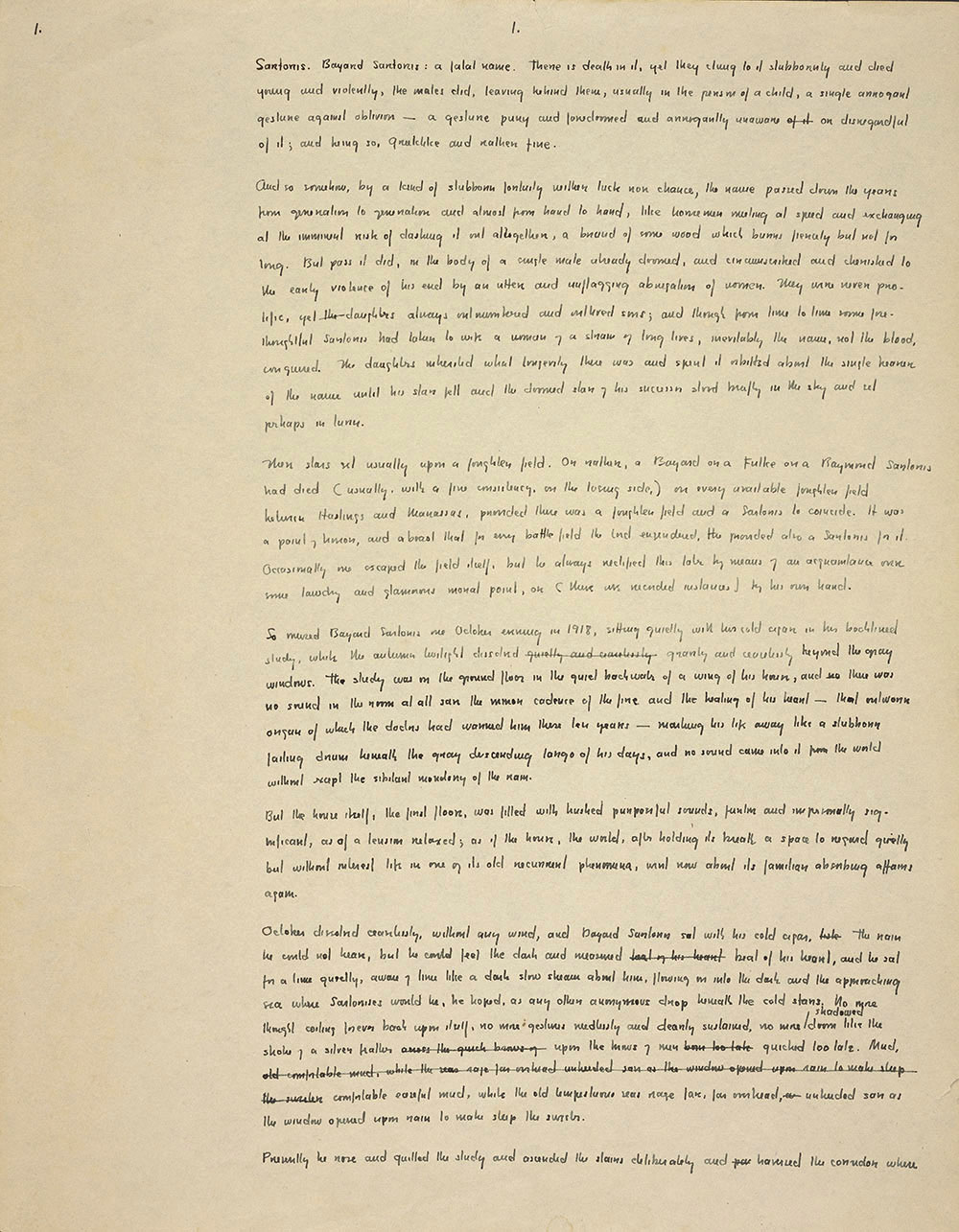TRANSCRIPTION
1.
Sartoris. Bayard Sartoris: a fatal name. There is death in it, yet they clung to it stubbornly and died
young and violently, the males did, leaving behind them, usually in the person of a child, a single arrogant
gesture against oblivion — a gesture puny and foredoomed and arrogantly unaware <of it> or disregardful
of it; and being so, Greeklike and rather fine.
And so somehow, by a kind of stubborn fortuity neither luck nor chance, the name passed down the years
from generation to generation and almost from hand to hand, like horsemen meeting at speed and exchanging
at the imminent risk of dashing it out altogether, a brand of some wood which burns fiercely but not for
long. But pass it did, in the body of a single male already doomed, and circumscribed and cherished to
the early violence of his end by an utter and unflagging abnegation of women. They were never pro-
lific, yet <the> daughters always outnumbered and outbred sons; and though from time to time some fore-
thoughtful Sartoris had taken to wife a woman of a strain of long lives, inevitably the name, not the blood,
conquered. The daughters inherited what longevity there was and spent it orbited about the single bearer
of the name until his star fell and the doomed star of his successor stood briefly in the sky and set
perhaps in turn.
Men stars set usually upon a foughten field. Or rather, a Bayard or a Fulke or a Bayard Sartoris
had died (usually, with a fine consistency, on the losing side,) on every available foughten field
between Hastings and Manassas, provided there was a foughten field and a Sartoris to coincide. It was
a point of honor, and a boast that for every battlefield the Lord engendered, He provided also a Sartoris for it.
Occasionally one escaped the field itself, but he always rectified this later by means of an acquaintance over
some tawdry and glamorous moral point, or (there are recorded instances) by his own hand.
So mused Bayard Sartoris one October evening in 1918, sitting quietly with his cold cigar in his booklined
study, while the autumn twilight dissolved <quietly and ceaselessly> gravely and ceaselessly beyond the gray
windows. The study was on the ground floor in the quiet backwater of a wing of his house, and <no> there was
no sound in the room at all save the minor cadence of the fire and the beating of his heart — that outworn
organ of which the doctors had warned him these ten years — [wasting?] his life away like a stubborn
failing drum beneath the gray descending [largo?] of his days, and no sound came into it from the world
without except the sibilant monotomy of the rain.
But the house itself, the first floor, was filled with hushed purposeful sounds, [furtive?] and impersonally sig-
nificant, as of a tension relaxed; as if the house, the world, after holding its breath a space to regard quietly
but without interest life in one of its old recurrent phenomena, went about its familiar absorbing affairs
again.
October dissolved ceaselessly, without any wind, and Bayard Sartoris sat with his cold cigar, <liste> The rain
he could not hear, but he could feel the dark and measured <beat of his heart> beat of his heart, and he sat
for a time quietly, aware of time like a dark slow stream about him, flowing on into the dark and the approaching
sea where Sartorises would be, he hoped, as any other anonymous drop beneath the cold stars. No more
thought coiling forever back upon itself, no more gestures needlessly and dearly sustained, no more shadowed doom like the
stroke of a silver feather <across the quick brows of> upon the brows of men <born too late> [quicked?] too late. Mud,
<old comfortable mud, while the seas rage far overhead unheeded save as the window opened upon rain to make sleep
the sweeter> comfortable easeful mud, while the old tempestuous seas rage far, far overhead, <a> unheeded save as
the window opened upon rain to make sleep the sweeter.
Presently he rose and quitted the study and ascended the stairs deliberately and <pa> traversed the corridor where
|


